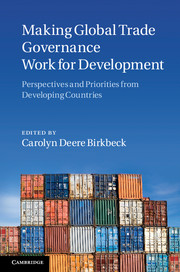 Making Global Trade Governance Work for Development
Making Global Trade Governance Work for Development from Part IV - Making WTO negotiations and decision-making processes fairer
Published online by Cambridge University Press: 07 September 2011
For much of the post-Second World War era, maintaining global trade governance has largely been the responsibility of developed countries, particularly under the 1947 General Agreement on Tariffs and Trade (GATT 1947). With the launch of the Uruguay Round, developing countries began to play a more active and consistent role in global trade governance. However, developing countries had and continue to struggle with how to ensure that their concerns and interests are reflected in global trade policy outcomes.
Today, the need for collective action by developing countries is greater and more urgent than ever, for several reasons. First, the world economy has an ever greater importance for developing countries’ national development, economic policy, environmental space and sovereignty. Second, the development process is increasingly complex and not conducive to sectoral or narrow approaches. Third, developed countries continue to dominate multilateral processes, institutions and outcomes in ways that impact developing countries’ political and economic space, as well as their opportunities to use their economic, social and environmental endowments.
To save this book to your Kindle, first ensure no-reply@cambridge.org is added to your Approved Personal Document E-mail List under your Personal Document Settings on the Manage Your Content and Devices page of your Amazon account. Then enter the ‘name’ part of your Kindle email address below. Find out more about saving to your Kindle.
Note you can select to save to either the @free.kindle.com or @kindle.com variations. ‘@free.kindle.com’ emails are free but can only be saved to your device when it is connected to wi-fi. ‘@kindle.com’ emails can be delivered even when you are not connected to wi-fi, but note that service fees apply.
Find out more about the Kindle Personal Document Service.
To save content items to your account, please confirm that you agree to abide by our usage policies. If this is the first time you use this feature, you will be asked to authorise Cambridge Core to connect with your account. Find out more about saving content to Dropbox.
To save content items to your account, please confirm that you agree to abide by our usage policies. If this is the first time you use this feature, you will be asked to authorise Cambridge Core to connect with your account. Find out more about saving content to Google Drive.